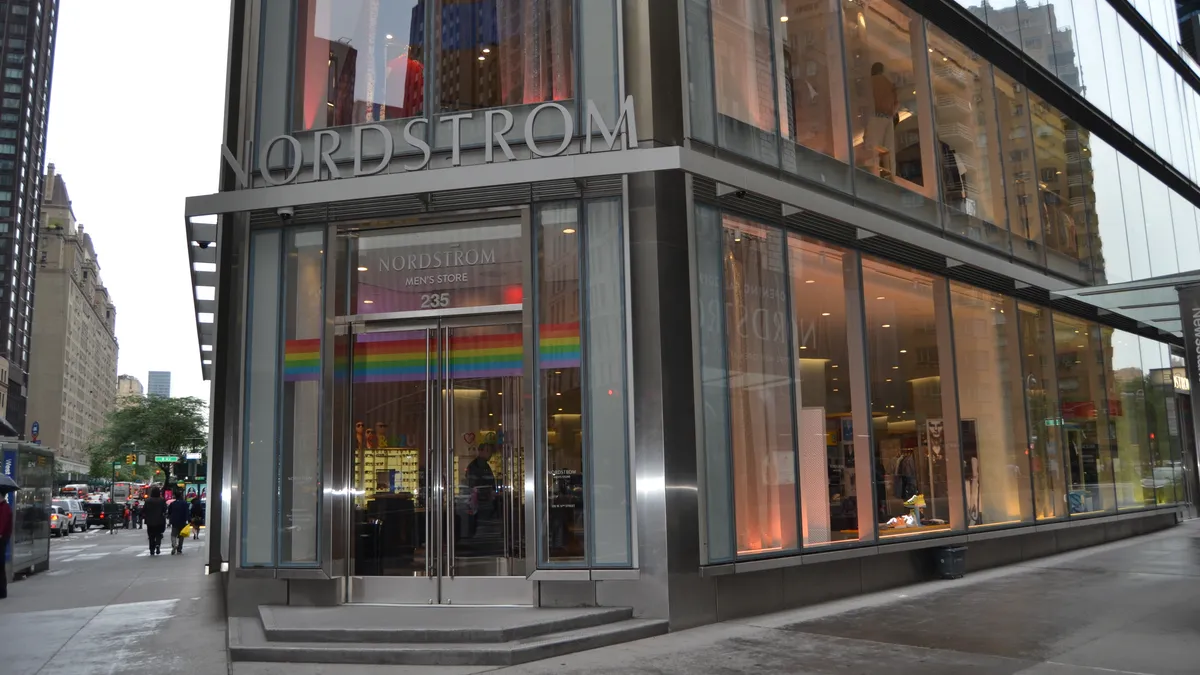Dive Brief:
-
The Nordstrom family is pursuing an effort to increase its stake in the department store from about a third to more than 50%, the Wall Street Journal reported, citing unnamed sources.
-
The retailer's stock price has plummeted to just over $33 per share since a failed attempt by the group to take the company private for $50 per share, a price rejected by the board as "inadequate."
-
"We don't comment on rumors or speculation in the market," a Nordstrom spokesperson told Retail Dive in an email. A spokesperson for the family group didn't immediately return Retail Dive's request for comment.
Dive Insight:
The Nordstrom family was frustrated in its efforts in 2017 and 2018 to take back the business founded in 1901 as a shoe store by their great-grandfather, John W. Nordstrom, whose initials serve as the company's stock ticker.
Members of the group, which last year included Nordstrom Co-Presidents Blake Nordstrom, Peter Nordstrom and Erik Nordstrom, President of Stores James Nordstrom, Chairman Emeritus Bruce Nordstrom and Anne Gittinger, have worked at the retailer for decades, in various roles. Blake Nordstrom earlier this year died unexpectedly.
A go-private deal is widely seen as an attempt to give Nordstrom management more time and freedom to reinvent the business for the modern retail climate. It could also preempt the kind of activist rebellion that several department store chains — including Hudson's Bay Company, Macy's and Dillard's, among others — have had to fend off in recent years. HBC is in the midst of its own take-private attempt, which an activist has already deemed "woefully inadequate."
Nordstrom's troubles have only deepened. Revenue even at its Rack off-price unit, usually a bright spot, fell 0.6% in the first quarter, as full-line store revenue tumbled 5.1%. The lower sales volume pushed down earnings before interest and taxes (EBIT) to $77 million, or 2.3% of net sales, down from $153 million, or 4.4% of net sales, a year before. Gross profit, as a percentage of net sales, declined 60 basis points to 33.5%. Net income fell to $37 million from $87 million in the year-ago quarter.
The troubles prompted UBS analysts last month to downgrade the department store to a "no-growth retailer," noting that shoppers now look for pricier attire elsewhere and are more likely to seek out more casual attire. That followed a lowered outlook from S&P Global in May. Nordstrom has also hit snags in its loyalty revamp and fielded complaints from longtime customers about how it structured early access to its much-anticipated anniversary sale.
But the retailer is also among the most innovative in the sector, including a tech-quisition strategy that has helped it reach new customers, refine its merchandising and explore cutting-edge retail concepts. The department store has opened in-store pop-ups to feature up-and-coming brands and is expanding its merchandise-free "Local" shops.
"You need only look at something like Nordstrom's Local as an example of one of the few remaining viable department store retailers understanding what the next chapter looks like," retail analyst and consultant Sanford Stein, author of "Retail Schmetail," told Retail Dive earlier this year.
Erik Nordstrom told a Shoptalk keynote audience in March that the company possesses a sense of urgency, noting that "we've been too slow."
"Our stores are long-term investments," he also said. "Inevitably there are external forces in the environment that we can't control."
Those remain key reasons for the family to again attempt to gain better control, and revitalizing its performance may require drastic changes to the department store model, according to Thomai Serdari, a professor of luxury marketing and branding at New York University's Stern School of Business.
"A business that is tied to short-term results to satisfy Wall Street investors has limited chances in succeeding making that shift," she said in an email. "Retail innovation will result from strategic thinking that is risk taking and laser focused. A private company (think of retail space STORY) or a majority privately held business can create the long-term horizon necessary to tackle the challenge."















